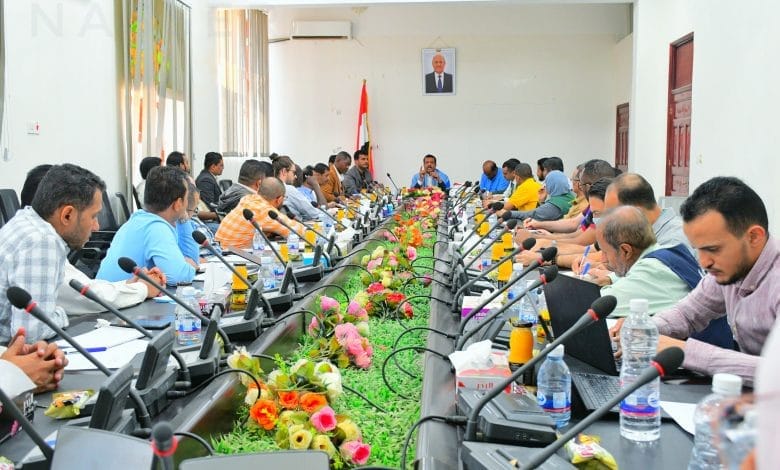
In Marib Governorate, the quarterly meeting of humanitarian partners UN Agency , international ,local organizations was held, headed by the Deputy governor. Abd Rabbo Muftah, and the General manager of the Executive Unit for the Displaced, Saif Muthanna, to discuss the humanitarian situation and the humanitarian and development interventions that took place during the past months in each Cluster, and to strengthen the relationship between Humanitarian action partners and the local authority and plans to prioritize interventions for the coming months.
Deputy Governor Muftah valued the humanitarian role of partners from the UN , international , and local organizations to alleviate the human suffering of the displaced and the host community in the governorate.. He pointed to the continued deterioration of the humanitarian situation, a reflection of the decline in interventions, economic and living deterioration, natural disasters and the continued displacement to the governorate.
Deputy Governor Muftah stressed that the humanitarian needs in the governorate are still increasing, and the gap between the needs and interventions is widening more and more every day, especially in the areas of food, education, health, WASH , Shelter/NFIs . He pointed out that natural disasters from torrential rains and storms that The governorate witnessed during the past two months, which caused the catastrophe of more than 18,000 families in the governorate.. praising the role of the King Salman Center for Relief and Humanitarian and its initiatives in speeding up the emergency response and providing rapid humanitarian, food, financial and shelter interventions to relief hundreds of stricken families.
At the beginning of the meeting, the General manager of the Executive Unit, Saif Muthanna, welcomed the UN , international and local organizations.. praising their efforts to alleviate the suffering of the displaced in the Ma’rib governorate.. He stressed the aspiration of the Executive Unit to move from relief to development, stressing the necessity and importance of coordination, so that there would be a joint action plan and participation. IDPs in planning sustainable projects that meet the requirements of life.
OCHA reviewed the efforts made by the office to coordinate and mobilize support and humanitarian interventions for the governorate during the past period.. He pointed out that 9 UN organizations and 14 international organizations have opened offices in the governorate, and many humanitarian blocs are being activated. Currently to activate the cash working group
OCHA also reviewed the size of the interventions and the gap between the needs and interventions, and the processes of tracking and monitoring the displaced families that constantly arrive in the governorate, where 2,206 displaced families to Marib were monitored during the months (January-September).
The meeting identified several priorities for humanitarian interventions during the last quarter of this year, including: covering the gap for the remaining needs of families affected by torrential rains and floods, expanding the humanitarian response to the needs in existing camps that are humanly supervised by UN organizations, and expanding to remote camps that were not covered by coverage. From before.
The meeting stressed the focus in humanitarian income on sustainable and development solutions and projects and work on activating the cash money group for emergency aid, in addition to creating a reserve stock from all sectors for very emergency interventions and working to mobilize more funding from multiple and new sources.